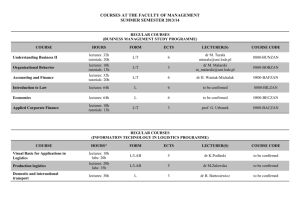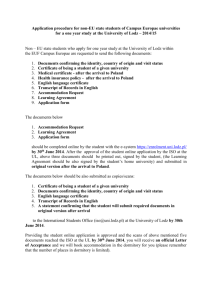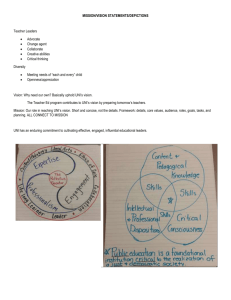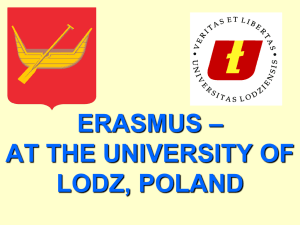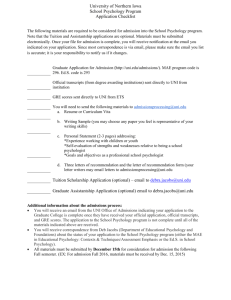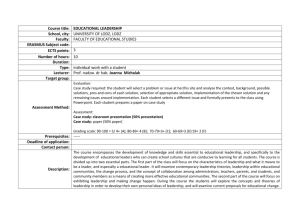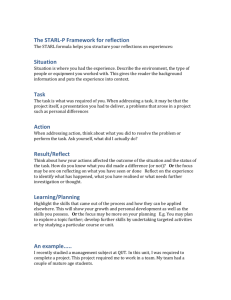COURSES AT THE FACULTY OF MANAGEMENT
advertisement
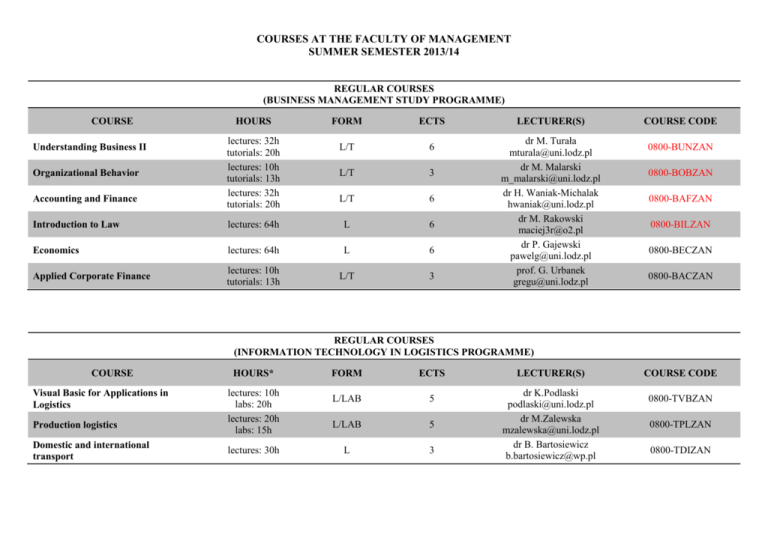
COURSES AT THE FACULTY OF MANAGEMENT SUMMER SEMESTER 2013/14 REGULAR COURSES (BUSINESS MANAGEMENT STUDY PROGRAMME) COURSE Understanding Business II Organizational Behavior Accounting and Finance HOURS lectures: 32h tutorials: 20h lectures: 10h tutorials: 13h lectures: 32h tutorials: 20h FORM ECTS L/T 6 L/T 3 L/T 6 Introduction to Law lectures: 64h L 6 Economics lectures: 64h L 6 Applied Corporate Finance lectures: 10h tutorials: 13h L/T 3 LECTURER(S) dr M. Turała mturala@uni.lodz.pl dr M. Malarski m_malarski@uni.lodz.pl dr H. Waniak-Michalak hwaniak@uni.lodz.pl dr M. Rakowski maciej3r@o2.pl dr P. Gajewski pawelg@uni.lodz.pl prof. G. Urbanek gregu@uni.lodz.pl COURSE CODE 0800-BUNZAN 0800-BOBZAN 0800-BAFZAN 0800-BILZAN 0800-BECZAN 0800-BACZAN REGULAR COURSES (INFORMATION TECHNOLOGY IN LOGISTICS PROGRAMME) COURSE Visual Basic for Applications in Logistics Production logistics Domestic and international transport HOURS* lectures: 10h labs: 20h lectures: 20h labs: 15h lectures: 30h FORM ECTS L/LAB 5 L/LAB 5 L 3 LECTURER(S) dr K.Podlaski podlaski@uni.lodz.pl dr M.Zalewska mzalewska@uni.lodz.pl dr B. Bartosiewicz b.bartosiewicz@wp.pl COURSE CODE 0800-TVBZAN 0800-TPLZAN 0800-TDIZAN REGULAR COURSES – ELECTIVES (BUSINESS MANAGEMENT STUDY PROGRAMME) COURSE Project Development Organizational Culture HOURS* lectures: 8h tutorials: 32h lectures: 32h tutorials: 40h FORM ECTS L/T 9 L/T 9 Conflict Management discussion class: 40h D 4 Business Excellence discussion class: 40h D 4 Change Management discussion class: 40h D 4 Innovation Management discussion class: 40h D 4 Management by Values discussion class: 40h D 4 Management Challenge discussion class: 40h D 4 Time Management discussion class: 40h D 4 LECTURER(S) prof. W. Nasierowski nasierow@unb.ca prof. T. Czapla t_czapla@uni.lodz.pl dr J. Michalak drjoannamichalak@interia.pl prof. M. Urbaniak murb@uni.lodz.pl dr G. Wieteska gwieteska@uni.lodz.pl dr J. Michalak drjoannamichalak@interia.pl dr P. Głodek glodek@uni.lodz.pl dr I. Świątek-Barylska swiatek@uni.lodz.pl dr J. Czarnecki jczarnecki@uni.lodz.pl dr W. Urlych wulrych@uni.lodz.pl COURSE CODE 0800-BPDWZN 0800-BOCWAN 0800-ZOMEBN 0800-ZBEEBN 0800-ZCMEBN 0800-ZIMEBN 0800-ZMVEBN 0800-ZMHEBN 0800-ZTMEBN COURSES FOR ERASMUS STUDENTS (will open if 8 students enrol) COURSE HOURS* FORM ECTS LECTURER(S) COURSE CODE Business Ethics discussion class: 20h D 6 prof. J.F. Lozano 0800-ERAS23 Management of Non-Governmental Organizations discussion class: 20h D 6 Corporate Social Responsibility discussion class: 20h D 6 Global Business Challenges - business game discussion class: 20h D 6 Corporate governance discussion class: 20h D 6 Introduction to Database Management Systems discussion class: 20h D 6 Qualitative Research Methods in Business discussion class: 20h D 6 Ordenacion del territorio y medio ambiente (course offered in SPANISH) discussion class: 20h D 6 Management Accounting(F2 ACCA) discussion class: 30h D 6 Financial Accounting (F3 ACCA) discussion class: 30h D 6 discussion class: 20h D 6 dr J. Szczepanik j.szczepanik.uni@gmail.com 0800-ERAS37 discussion class: 20h D 6 dr J. Szczepanik j.szczepanik.uni@gmail.com 0800-ERAS38 discussion class: 20h D 6 dr J. Szczepanik j.szczepanik.uni@gmail.com 0800-ERAS39 Bedingungen der Wirtschaftsaktivitäten der kleinen und mittelständischen Unternehmen in Polen (course offered in GERMAN) Ausländische Investitionen in Polen (course offered in GERMAN) Inländische Unternehmungen auf den ausländischen Märkten (course offered in GERMAN) dr A. Rudnicka-Reichel rudnicka@uni.lodz.pl dr A. Rudnicka-Reichel rudnicka@uni.lodz.pl dr J. Reichel jreichel@uni.lodz.pl dr A. Rudnicka-Reichel rudnicka@uni.lodz.pl dr J. Reichel jreichel@uni.lodz.pl dr L. Bohdanowicz lbohdan@uni.lodz.pl dr R. Kurzyjamski rysk@uni.lodz.pl dr A. Sibińska annasibi@uni.lodz.pl dr D. Sikora-Fernandez dorotas@uni.lodz.pl dr E. Zarzycka ezarzycka@uni.lodz.pl dr E. Zarzycka ezarzycka@uni.lodz.pl 0800-ERAS24 0800-ERAS18 0800-ERAS30 0800-ERAS31 0800-ERAS32 0800-ERAS33 0800-ERAS36 0800-ERAS34 0800-ERAS35 Public Finance discussion class: 20h D 6 Decision Making discussion class: 20h D 6 Abbreviations: L – lecture; T – tutorial; D – discussion class; LAB – computer lab; dr M. Turała mturala@uni.lodz.pl dr P. Czajor pczajor@uni.lodz.pl 0800-ERAS22 0800-ZE2FBN COURSE DESCRIPTIONS REGULAR COURSES (BUSINESS MANAGEMENT STUDY PROGRAMME) Understanding Business II The overriding objective of this course is to practice and experience business related concepts introduced in Understanding Business I. Students will bring into class simulations and other activities which are going to illustrate the same set of issues as in Understanding Business I, yet the emphasis will be placed on mechanisms and mutual interdependencies, rather than individual phenomena. Organizational Behavior The aim of the course is to give the overall and holistic perspective at basic processes within organizations through various relations between internal resources and between organizations and their environment. Showing the main ideas and trends in connection to global environment, human behavior and authority relations, participation in execution of power within an organization, human behavior in functional relations. Accounting and Finance The course is mainly focused on accounting and financial systems in the company. Presentation of the most important accounting and financial tools for management is the main goal of the lectures. The course is divided into two groups of problems: accounting measurement of financial phenomena and financial decision making. Nevertheless those problems will be presented as a merged item. The ambition of the course is to show necessary relation between the accounting system and financial management in the company. The course will be also an introduction to more advanced courses of accounting and finance. Students will be required to evaluate and indicate the influence of the accounting operations and managerial decisions on the company financial situation. Introduction to Law to be announced Economics The major goal of the course is to familiarize students with the problems of the functioning of market economy and its main actors: product markets, households, firms and markets of production factors. Additionally, its goal is to pay attention to the basic failures of the market and the role of the state in reduction of those failures. Applied Corporate Finance The major goal of this course is to get acquainted with application of financial theory into management practice. During the course students will learn about how to effectively undertake decision regarding investments, capital structure and dividend policy. Students also will be acquainted with basic methods of company valuation. REGULAR COURSES (INFORMATION TECHNOLOGY IN LOGISTICS PROGRAMME) Visual Basic for Applications in Logistics Course is an introduction to Visual Basic for Applications, focusing on elements of VBA useful in logistic companies. Production logistics This course is to familiarize students with modern techniques and methods of operational management processes. The main issue is the strategy of the organization and its choice of the functioning of the market. On the basis of this two issues company designs its main processes that gives value and other – supportive ones. The ways of increasing efficiency, ensuring the operational effectiveness and continuous improvement processes are shown. 1. Environmental, legal, socio-economic and historical determinants of transport development 2. Rules of development planning and factors of location of transport infrastructure 3. Water transport - organization, infrastructure, route of main waterways, location of main ports, directions and amount of transportation flows Domestic and international transport 4. Railway transport - organization, infrastructure, route of main railway routes, location of main railway junctions, directions and amount of transportation flows 5. Road transport - organization, infrastructure, route of main roads, location of main road junctions, directions and amount of transportation flows 6. Air transport - organization, infrastructure, route of main air routes, location of main airports, directions and amount of transportation flows 7. Pipeline transport - organization, infrastructure, route of main pipelines, directions and amount of transportation flows 8 Contemporary directions of transport development in Poland and Europe REGULAR COURSES – ELECTIVES (BUSINESS MANAGEMENT STUDY PROGRAMME) Project Development to be announced Organizational Culture to be announced Conflict Management to be announced Business Excellence The course aims at presenting selected concepts, methods and tools of quality and excellence management, that are used to improve organization and processes. Change Management During the course the students will learn how to deal with change in organization and understand how to lead the change, engage with change and "survive" the change. Innovation Management The course aims at the providing knowledge in the area of theoretical as well as practical aspects related to management of innovative process in modern company. Management by Values During the course the students will learn about the role of core values in managing organizations. The process of Management by Values will be presented, discussed and trained. Management Challenge to be announced Time Management The aim of the course is to provide students with tools and tips to manage their time more productively both as a student and as an executive manager in the long run. COURSES FOR ERASMUS STUDENTS (will open if 8 students enrol) Business Ethics The main point of the course is to understand how different ethical theories explain moral behaviour and the real world activity. The other central issues are: interactions between environment, society and economy; a role of ethics in business activity. These areas will be explored through literature, real life case studies, presentations, class discussions and other individual or group activities. Management of NonGovernmental Organizations The general aim of the course is presentation of non-governmental organization (NGO) in different European countries. Students will have the opportunity to know the principles and scope of actions taken by NGOs and understand the nature and importance of nongovernmental organizations. Students will develop their skills in the field of social project management. Corporate Social Responsibility The main point of the course is to understand corporate social responsibility (CSR) as a part of strategic thinking. As a consequence of strategic approach to CSR students will learn how to plan and implement corporate social responsibility program in the form of strategy (mission/vision/strategic analysis/setting goals/programming/realisation/evaluation). The central issues are understanding stakeholders needs and preparing stakeholders analysis. These areas will be explored through literature, real life case studies, presentations, class discussions and other individual or group activities – both during meetings and as homework. Global Business Challenges usiness game During the classes students will play the business game and then all important topics that will arise thanks to the game will be discussed. Max. 15 – 18 students (this limit is crucial for the business game). Corporate governance The course is aimed at presenting corporate governance issues in international context. The activities during the course will be focused on: Internal and external corporate governance mechanisms Corporate frauds detection Board models Course program and proposed schedule: What is corporate governance? Corporate governance mechanisms Shareholders value theory and stakeholders theory. Corporate frauds detection - workshop Systems of corporate governance: Taxonomy and main features Board models: One tier board and two-tier board Board functions, size and composition Codes of best practices in corporate governance Introduction to Database Management Systems During the theoretical short introduction there will be covered the fundamentals of database modeling and database management systems (DBMS) technology and its use in business information systems. The topics includes the architecture and functions of DBMS, the database environment, and the developing of database application process. In the laboratory the students will model sample information system using the relational data model and the entity-relationship (ER) model. On the stage of physical database design they will translate the ER model into relational model (real database) using professional Database Management System – ORACLE, which offers large documentation in English. The last – but not least – topic is database exploration using industry standard query language SQL. The students will get the individual database user accounts, at some stages of database design they will work in small groups. Qualitative Research Methods in Business The course is giving a wild rage of background of qualitative research used for business purposes. The main intents of the course are: - present the qualitative approach to research and cover the main aspects of methodology, - describe different qualitative research methods and the possibility of their applications, - build and increase the positive understanding for market insight and customer behavior. In the course students will be introduced to: main aspects of data collection methods, characteristics of the main tools and techniques, data analysis methods. Ordenacion del territorio y medio ambiente Management Accounting (F2 ACCA) Los objetivos del curso son: 1. Introducir al alumno en la dimensión espacial y territorial de los 2. problemas ambientales. 3. Introducir al alumno en la dimensión espacial y territorial de los 4. problemas ambientales. 5. Proporcionar los conceptos y aspectos metodológicos básicos para abordar 6. la complejidad de la ordenación territorial. 7. Iniciar al alumno en el conocimiento de los diferentes instrumentos de 8. planificación territorial. Tema 1. Aspectos teóricos y conceptuales de la Ordenación del Territorio. Tema 2. La planificación urbanística y ambiental Tema 3. Análisis y diagnóstico del sistema territorial. Tema 4. El subsistema físico natural. Tema 5. El subsistema socioeconómico. Tema 6. El subsistema jurídico administrativo. Tema 7. Metodología de la planificación territorial. Fases de desarrollo. Tema 8. Información y fuentes en la planificación territorial. Tema 9. La participación en la Ordenación del Territorio. Tema 10. La gestión en la Ordenación del Territorio. The main aim of the course is to develop knowledge and understanding of providing basic management information in an organisation to support management in planning and decision-making. The course would provide students with English vocabulary in the field of financial accounting. Moreover the course is preparing the students to passing ACCA F2 exam. The ACCA qualification structure requires candidates who wish to be awarded the Diploma in Accounting and Business to pass the F1, F2 and the F3 examinations and successfully complete the Foundations in Professionalism module. Note: following successful completion of the course the students may attempt an F2 Management Accounting ACCA examination at the ACCA Examination Centre at the Faculty of Management. The cost of attempting the (facultative) examination consists of the registration fee and the examination fee (for details please go to http://www.accaglobal.com/) Financial Accounting (F3 ACCA) The main aim of the course is to develop knowledge and understanding of the underlying principles and concepts relating to financial accounting and technical proficiency in the use of double-entry accounting techniques including the preparation of basic financial statements for single entities and simple groups. The syllabus also introduces basic techniques of interpretation of financial statements. The course would provide students with English vocabulary in the field of financial accounting. Moreover the course is preparing the students to passing ACCA F3 exam. The ACCA qualification structure requires candidates who wish to be awarded the Diploma in Accounting and Business to pass the F1, F2 and the F3 examinations and successfully complete the Foundations in Professionalism module. Note: following successful completion of the course the students may attempt an F2 Management Accounting ACCA examination at the ACCA Examination Centre at the Faculty of Management. The cost of attempting the (facultative) examination consists of the registration fee and the examination fee (for details please go to http://www.accaglobal.com/) Bedingungen der Wirtschaftsaktivitäten der kleinen und mittelständischen Unternehmen in Polen Ziel: Darstellung der Entwicklung des Sektors der kleinen und mittelständischen Unternehmungen in Polen. Analyse der grundlegenden ökonomischen, organisatorischen und juristischen Bedingungen der Geschäftsaktivitäten. Staatliche/europäische Förderung des Sektors. Fallstudien. Ausländische Investitionen in Polen Ziel: Darstellung der Entwicklung und der Struktur der ausländischen Investitionen in Polen. Analyse der grundlegenden ökonomischen, organisatorischen und juristischen Bedingungen der Geschäftsaktivitäten. Praktische Hinweise für künftige Investoren. Fallstudien. Inländische Unternehmungen auf den ausländischen Märkten Ziel: Darstellung der Bedingungen der Internationalisierung der Geschäftsbeziehungen der inländischen Unternehmen. Besprechung der Hauptformen der Geschäftsabwicklung im Ausland. Analyse der ausgewählten Elemente der Außenhandelstechnik. Fallstudien. Public Finance The course aims at familiarising the students with the nature and mechanisms of public finance. The course focuses on issues of budgeting, public spending, social insurance and tax policies. Contents covers the subject, functions, raising of public finance, taxation, public spending, budget equilibrium, and regional and local public spending. Decision Making Presentation of the essence of risk and uncertainty and the influence of risk on decision making. Presentation of risk modeling process, risk measures and criteria of decision making under risk and uncertainty.
